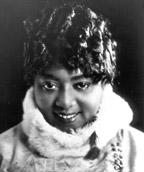






| Wild Women Don't Have the Blues What we call the blues can be traced back to the work songs of generations of Black fieldhands. Ma Rainey, "Mother of the Blues," first put this folk idiom on stage in 1902. Others, like Ida Cox and Bessie Smith, took songs like "Downhearted Blues" and "Jailhouse Blues" on the road with traveling vaudeville and minstrel shows. The Blues performers provided cultural continuity for millions of blacks who migrated from the rural South to the industrial cities of the North during World War I. Mamie Smith broke new ground in the 1920s when she shouted out "Crazy Blues" - the first blues recording by a a black woman and one that opened up the recording industry to black artists. Bessie Smith brought black music to a national audience in the groundbreaking early "talkie" St. Louis Blues. Survivors of the blues era remind us that celebrity status offered little protection against segregation and economic exploitation. Few of these women received much financial reward from their popularity. With the Depression,
American musical taste shifted towards the upbeat sounds of swing, and
the classic blues died out. Yet as contemporary Chicago blues artist
Koko Taylor reminds us, the blues and their legacy continue. "You
get up in the morning and go to work and your boss tells you you been
laid off. Your got the blues. Believe it or not, even the President's
got the blues."
|
"A superb look
at the idiom and its origins." "A must for
libraries, high schools, colleges and just about everybody else." "Shows how
America changed after WWI when a wave of black immigrants left the South
searching fro work...Plenty of sparkle and wit." "History
at its very best." "A brilliant
film that reveals the central role of women performers in the blues." "Teaches
tremendously moving lessons about race, gender and class...Invaluable
in women's studies, history and music course." Producer/Director:
Christine Dall Video
Purchase: $195
|
 Wild
Women Don't Have the Blues shows how the blues were born out of
the economic and social transformation of African American life early
in this century. It recaptures the lives and times of Ma Rainey, Bessie
Smith, Ida Cox, Alberta Hunter, Ethel Waters and the other legendary
women who made the blues a vital part of American culture. The film
brings together for the first time dozens of rare, classic renditions
of the early blues
Wild
Women Don't Have the Blues shows how the blues were born out of
the economic and social transformation of African American life early
in this century. It recaptures the lives and times of Ma Rainey, Bessie
Smith, Ida Cox, Alberta Hunter, Ethel Waters and the other legendary
women who made the blues a vital part of American culture. The film
brings together for the first time dozens of rare, classic renditions
of the early blues